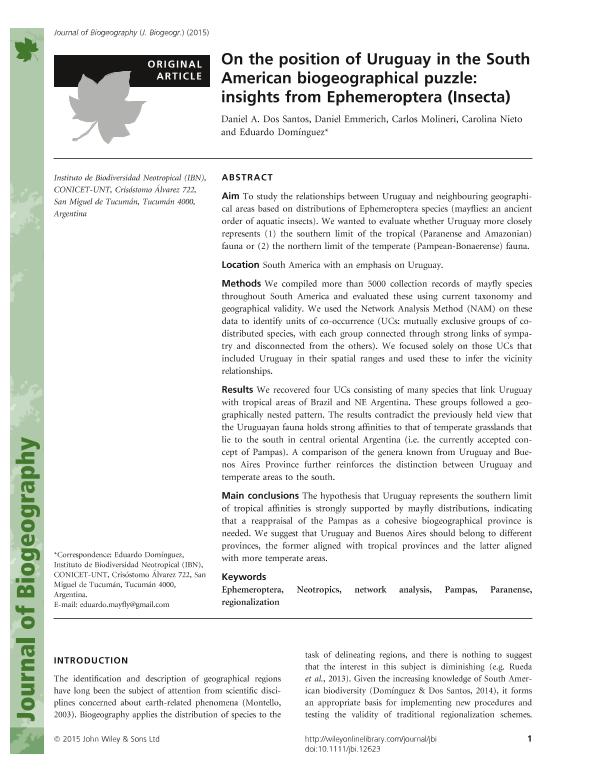Mostrar el registro sencillo del ítem
dc.contributor.author
Dos Santos, Daniel Andrés

dc.contributor.author
Emmerich, Daniel
dc.contributor.author
Molineri, Carlos

dc.contributor.author
Nieto, Carolina
dc.contributor.author
Dominguez, Eduardo

dc.date.available
2017-02-10T17:25:46Z
dc.date.issued
2016-02
dc.identifier.citation
Dos Santos, Daniel Andrés; Emmerich, Daniel; Molineri, Carlos; Nieto, Carolina; Dominguez, Eduardo; On the position of Uruguay in the South American biogeographical puzzle: insights from Ephemeroptera (Insecta); Wiley Blackwell Publishing, Inc; Journal Of Biogeography; 43; 2; 2-2016; 361–371
dc.identifier.uri
http://hdl.handle.net/11336/12841
dc.description.abstract
Aim: To study the relationships between Uruguay and neighbouring geographical areas based on distributions of Ephemeroptera species (mayflies: an ancient order of aquatic insects). We wanted to evaluate whether Uruguay more closely represents (1) the southern limit of the tropical (Paranense and Amazonian) fauna or (2) the northern limit of the temperate (Pampean-Bonaerense) fauna.
Location: South America with an emphasis on Uruguay.
Methods: We compiled more than 5000 collection records of mayfly species throughout South America and evaluated these using current taxonomy and geographical validity. We used the Network Analysis Method (NAM) on these data to identify units of co-occurrence (UCs: mutually exclusive groups of co-distributed species, with each group connected through strong links of sympatry and disconnected from the others). We focused solely on those UCs that included Uruguay in their spatial ranges and used these to infer the vicinity relationships.
Results: We recovered four UCs consisting of many species that link Uruguay with tropical areas of Brazil and NE Argentina. These groups followed a geographically nested pattern. The results contradict the previously held view that the Uruguayan fauna holds strong affinities to that of temperate grasslands that lie to the south in central oriental Argentina (i.e. the currently accepted concept of Pampas). A comparison of the genera known from Uruguay and Buenos Aires Province further reinforces the distinction between Uruguay and temperate areas to the south.
Main conclusions: The hypothesis that Uruguay represents the southern limit of tropical affinities is strongly supported by mayfly distributions, indicating that a reappraisal of the Pampas as a cohesive biogeographical province is needed. We suggest that Uruguay and Buenos Aires should belong to different provinces, the former aligned with tropical provinces and the latter aligned with more temperate areas.
dc.format
application/pdf
dc.language.iso
eng
dc.publisher
Wiley Blackwell Publishing, Inc

dc.rights
info:eu-repo/semantics/openAccess
dc.rights.uri
https://creativecommons.org/licenses/by-nc-sa/2.5/ar/
dc.subject
Ephemeroptera
dc.subject
Neotropics
dc.subject
Network Analysis
dc.subject
Pampas
dc.subject
Paranense
dc.subject
Regionalization
dc.subject.classification
Otros Tópicos Biológicos

dc.subject.classification
Ciencias Biológicas

dc.subject.classification
CIENCIAS NATURALES Y EXACTAS

dc.title
On the position of Uruguay in the South American biogeographical puzzle: insights from Ephemeroptera (Insecta)
dc.type
info:eu-repo/semantics/article
dc.type
info:ar-repo/semantics/artículo
dc.type
info:eu-repo/semantics/publishedVersion
dc.date.updated
2017-02-09T18:24:09Z
dc.identifier.eissn
1365-2699
dc.journal.volume
43
dc.journal.number
2
dc.journal.pagination
361–371
dc.journal.pais
Estados Unidos

dc.journal.ciudad
Hoboken
dc.description.fil
Fil: Dos Santos, Daniel Andrés. Consejo Nacional de Investigaciones Cientificas y Tecnicas. Centro Cientifico Tecnologico Tucuman. Instituto de Biodiversidad Neotropical; Argentina. Universidad Nacional de Tucumán; Argentina
dc.description.fil
Fil: Emmerich, Daniel. Consejo Nacional de Investigaciones Cientificas y Tecnicas. Centro Cientifico Tecnologico Tucuman. Instituto de Biodiversidad Neotropical; Argentina. Universidad Nacional de Tucumán; Argentina
dc.description.fil
Fil: Molineri, Carlos. Consejo Nacional de Investigaciones Cientificas y Tecnicas. Centro Cientifico Tecnologico Tucuman. Instituto de Biodiversidad Neotropical; Argentina. Universidad Nacional de Tucumán; Argentina
dc.description.fil
Fil: Nieto, Carolina. Consejo Nacional de Investigaciones Cientificas y Tecnicas. Centro Cientifico Tecnologico Tucuman. Instituto de Biodiversidad Neotropical; Argentina. Universidad Nacional de Tucumán; Argentina
dc.description.fil
Fil: Dominguez, Eduardo. Consejo Nacional de Investigaciones Cientificas y Tecnicas. Centro Cientifico Tecnologico Tucuman. Instituto de Biodiversidad Neotropical; Argentina. Universidad Nacional de Tucumán; Argentina
dc.journal.title
Journal Of Biogeography

dc.relation.alternativeid
info:eu-repo/semantics/altIdentifier/doi/http://dx.doi.org/10.1111/jbi.12623
dc.relation.alternativeid
info:eu-repo/semantics/altIdentifier/url/http://onlinelibrary.wiley.com/doi/10.1111/jbi.12623/abstract
Archivos asociados
